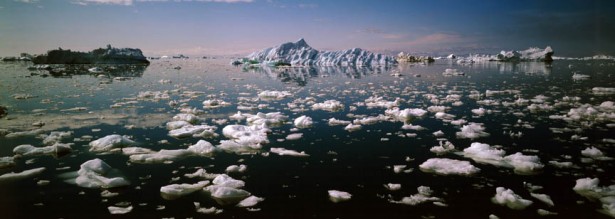
A new study released at this week’s International Polar Year Conference finds the energy dynamics of the Arctic Ocean changing drastically, and in ways not foreseen by previous climate change predictions.
It cost scientists of 10 teams from 27 countries $40 million over two years to conduct an all-season study of open water along the breaks in multi-year ice, which are known as flaw leads. The results paint a detailed picture of ways in which climate change is altering the Arctic’s marine ecosystem, from weather, ocean currents and the life of flora and fauna, all due to record lows of ice coverage and thickness.
“The Arctic Ocean is definitely changing on a whole lot of different fronts,” said Professor David Barber of the University of Manitoba, reported Postmedia News. The study analyzed data gathered by researchers aboard an icebreaker in the eastern Beaufort Sea, Postmedia News said.
It was just one of hundreds of papers being released and showcased as thousands of scientists meet in Montreal from April 22–27 to discuss all things Arctic. The 3,000-plus mostly non-aboriginal scientists are evaluating information gathered during International Polar Year, which went from 2007 to 2009. Inuit peoples at the conference are working hard to make their voices heard and get their longstanding knowledge taken into account.
Some of the damage is not straightforward, the study said. As the sun’s heat reaches newly opened waters, the resulting ice melt is affecting the carbon exchange between ocean and atmosphere, the study researchers said. Longer, warmer summers allow more carbon dioxide into the atmosphere and that the winter water absorbs more carbon dioxide, which drops to the bottom of the sea, the researchers said.
Released on April 24, the study did not surprise Inuit and other aboriginals, who have been observing nature for millennia and seen pronounced changes over the past generation or two. At the meeting the president of the Inuit Circumpolar Council, Aqqaluk Lynge of Greenland, told the participants that traditional knowledge could complement scientific evidence and analysis and emphasized that Inuit highly prize working with scientists.
“We as Inuit fully welcome the opportunity, indeed, the necessity, of working with scientists from around the world,” he said, giving the keynote speech at the conference on April 24. “We welcome and we need the IPY research and data generated so that our decisions may be made with sound and cutting-edge knowledge. We Inuit want to cooperatively move from knowledge to action.”
Lynge said that Inuit knowledge, ranging from traditional ceremonies, to technologies, to cultural expression and language, provides resources upon which scientific investigators can draw to enhance their understanding of the Arctic, he said, as reported in the Nunatsiaq News.
“From Knowledge to Action” is the theme of this year’s conference, and indigenous and scientific participants alike agreed that something must be done. The changes in the Arctic are happening so fast that scientific observation cannot keep up, the scientists concurred.
Panels deal with everything from responsible business and economic development to the health effects of climate change, of which there are many. The evenings of April 24 and 25 feature a film festival, as well, before the conference winds up on Friday the 27th.
© 1998 - 2012 Indian Country Today. All Rights Reserved To subscribe or visit go to: http://www.indiancountry.com